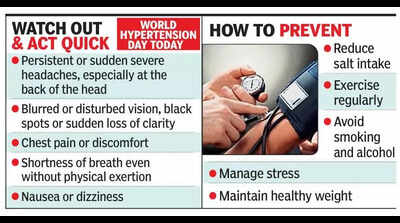Bengaluru: Urban lifestyle, stress and sleep deprivation are taking a severe toll on health of young adults. Conditions like accelerated hypertension, once rarely seen in people as young as 25 year olds, are now leading to more medical emergencies. Hospitals across Bengaluru are reporting a steady rise in the number of young patients walking into emergency rooms with dangerously high blood pressure levels — and often without warning.Accelerated hypertension refers to a sudden and severe rise in blood pressure, often shooting past 160/100 mm Hg and even reaching 180/120 in some cases. It can lead to acute complications such as stroke, brain bleeds, heart failure, and kidney damage, what doctors refer to as ‘end-organ damage’ if the golden hour of four hours is missed. Dr Basavaraj Utagi, senior consultant – cardiology at Fortis Hospital, said: “Over the past 3 to 4 years, there’s been at least a 20–25% increase in hypertension cases among people under 40. Now, we see at least 10 patients a day. What’s more worrying is that it’s not just early-stage hypertension. Even accelerated hypertension, which used to be rare, is showing up more often.”A convergence of modern lifestyle habits is behind the trend. “There’s more smoking, alcohol use, recreational drug consumption, processed food intake, obesity, and physical inactivity than ever before. Urban lifestyles, shift work, chronic stress, and sleep deprivation add to the burden. It’s a perfect storm,” Dr Utagi noted.Dr Abhijit Vilas Kulkarni, senior consultant, interventional cardiology, Apollo Hospitals, added they now see 3–4 cases of accelerated hypertension every day, even in young people, who appear physically healthy. “Most people don’t even know they are hypertensive until they land in the ICU,” he said.Unlike regular hypertension, which can be managed with long-term monitoring, accelerated hypertension gets severe quickly. Symptoms like severe headache, breathlessness, chest pain, and blurred vision may appear suddenly, but by then, damage may already be underway. “We first assess whether any organs are affected using tests like ECGs, kidney function panels, or echocardiograms. If there’s evidence of organ damage, we begin treatment right away.Otherwise, we focus on lifestyle changes and encouraging exercises,” said Dr Kulkarni.Dr VS Prakash from Ramaiah Institute of Cardiac Sciences highlighted the growing concern: “We’re now seeing 4–5 cases of accelerated hypertension every week. It’s a rapid spike that can lead to stroke or what we call malignant hypertension, which can destroy organs if not treated in time.”Dr Sreekanth Shetty, director & HOD of cardiology at Sakra World Hospital, stressed the importance of routine health checks. “We see 15 cases a week. Many of them are young professionals, who had no idea they had high BP. Early detection through regular screening is the only way to prevent complications.”BOX: Watch out & act quickPersistent or sudden severe headaches, especially at the back of the headBlurred or disturbed vision, black spots, or sudden loss of clarityChest pain or discomfort Shortness of breath even without physical exertionNausea or dizzinessHow to preventReduce salt intakeExercise regularlyAvoid smoking and alcoholManage stress Maintain a healthy weight


